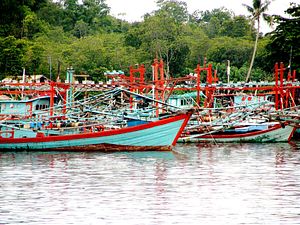Indonesian authorities began sinking vessels on Monday as the country prepared to commemorate its national day.
As I’ve written previously, Indonesia under President Joko “Jokowi” Widodo has launched a tough crackdown on illegal fishing in Indonesian waters, which he says causes the country to suffer annual losses of over $20 billion (See: “Explaining Indonesia’s ‘Sink the Vessels’ Policy Under Jokowi”).
That has resulted in a series of highly public sinking of boats from neighboring countries through 2015 – part of what Jokowi has described as a “shock therapy” approach – in spite of concerns among some of Indonesia’s neighbors.
Since Jokowi took office in October 2014, Indonesia has destroyed more than 170 vessels, according to government estimates. The last round of sinkings had taken place in April, with 23 Malaysian and Vietnamese ships being destroyed in seven locations across the country, and there had been indications that the next round will begin this week (See: “Indonesia Sinks 23 Foreign Vessels After China Spat”).
Ahead of its national day, which falls on August 17, Indonesian officials had said that the country would sink 71 foreign vessels as the country celebrated 71 years of independence. Indonesia’s Maritime Affairs and Fisheries Minister Susi Pudjiastuti also indicated as early as last month that the latest round of sinkings would include vessels from China.
“I expect the three can be sunk together on Aug. 17 with dozens of other vessels in Natuna,” she had said according to The Jakarta Post.
On Monday, Reuters reported that Indonesia had begun following through on this by sinking at least eight vessels from the Philippines in Maluku and Sulawesi. Instead of being blown up, the vessels were sunk by having holes poked into them to limit environmental damage.
Susi had also said that Jakarta would provide 400 ships and accommodation for hundreds of fishermen to operate in Natuna. As I have indicated previously, while Indonesia is not officially a claimant in the South China Sea disputes, Jakarta is an interested party because China’s nine-dash line overlaps with the Indonesian exclusive economic zone (EEZ) around the resource-rich Natuna Islands (See: “Indonesia’s South China Sea Policy: A Delicate Equilibrium”).































